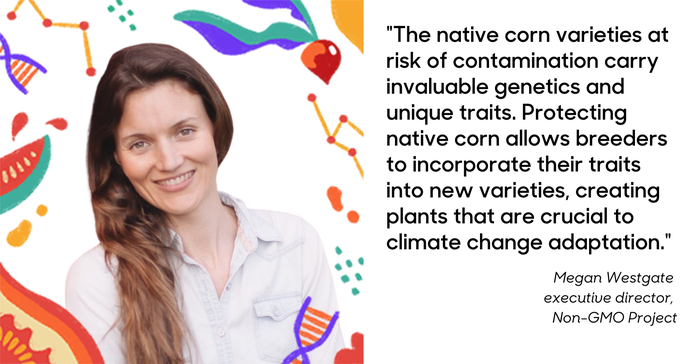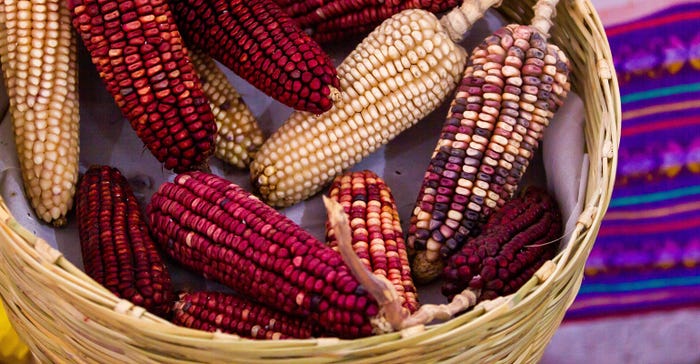The Future of Food: The natural products industry should stand with Mexico
Mexico's government, exercising its national sovereignty, wants to ban GMO corn imports to protect its diverse varieties of maize. Here's why this decision deserves support.

New Hope Network encourages its community members to share open and transparent dialogue about issues that are impacting the food industry and its future. Please help us keep this conversation going. If you’re interested in sharing your opinions on the future of food, email Jessica Rubino at [email protected]. All opinions are welcome.
Vibrant corn kernels sit in shallow dishes throughout the Non-GMO Project's offices. These seeds display vivid jewel tones — pale yellow, shining gold, deep wine and blue-black. The ancestral seed that makes this variety possible came from Mexico, where corn was domesticated thousands of years ago. Modern maize is handed down to us through generations of stewardship and skilled traditional crossbreeding. It has shaped the people who tended to it and is, in turn, shaped by them. This is the seed I hold in my hand to remind me why the work we do is so important.
Today, native corn varieties are threatened by contamination from GMO seeds. Their genetic inheritance could be lost forever, to the devastation of biodiversity and rich culture.
GMO contamination in the homeland of maize
Most of the world's GMOs come from the United States. More than 92% of the corn grown here is a GMO, according to the U.S. Department of Agriculture. As one of our largest agricultural trading partners, Mexico imports an estimated 16 billion tons of U.S. corn each year, mostly genetically modified yellow corn used for livestock feed or industrial purposes.
Mexican President López Obrador has pledged to restrict GMO corn imports and prohibit the use of glyphosate, the herbicide often paired with GMO crops. The move is seen as highly controversial by GMO agribusiness and the U.S. government. However, it is well worth defending. It is a stand for food sovereignty and a call to action for the natural products industry to protect the genetic abundance that flourishes in Mexican soil and in life on earth.
Corn varieties cross-pollinate with ease. One imported kernel of genetically modified corn could be unintentionally transported hundreds of miles, indistinguishable to the naked eye from non-GMO corn. Once planted, it introduces novel DNA sequences which impart herbicide resistance or cause the corn to produce an insecticide in its cells. The resulting GMO contamination is well-documented and threatens the genetic diversity of native corn varieties.

'The source of life'
The word "maize" originates from an indigenous word meaning "source of life." For at least 8,700 years, according to a Temple University study, corn has been central to Mexico's cultural identity. Even now, it's the backbone of food security and political stability. The crop's spiritual and social importance contrasts deeply with genetically modified corn's commodification, degradation and devaluation.
Mexico's GMO corn restrictions were originally proposed in 2020 as a full-scale ban. At that time, the move was criticized by U.S. corn representatives as a rejection of biotech crop traits "without any scientific basis," Reuters reports. For many of us in the natural products industry who are committed to honoring traditional wisdom and moving into right relationships with the natural world, this was a sadly familiar characterization. Dismissing Indigenous people's rejection of unwanted technology as "unscientific" is a common racist dog whistle. It's also simply not true. There is ample science supporting caution around GMOs and, to this day, many common GMOs have not undergone rigorous or independent testing.
Regardless, sovereignty means the right to self-determination, and the U.S. government is preventing Mexico from exercising its right to choose.

GMOs pose a threat to native Mexican corn and global biodiversity
"To lose a variety of maize in Mexico is to lose it throughout the planet," says a 2015 report authored by the Commission on Environmental Cooperation. Because Mexico is the center of origin for maize, "impacts on the genetic diversity of Mexican maize could have direct repercussions on the diversity of maize and ecosystems in all of North America and the rest of the world."
The native corn varieties at risk of contamination carry invaluable genetics and unique traits. Many can thrive in difficult growing conditions such as poor soil or mountainous land. Protecting native corn allows breeders to incorporate their traits into new varieties, creating plants that are crucial to climate change adaptation.
Stand with Mexico
In March, the Non-GMO Project asked industry partners to sign a letter supporting Mexico in its efforts to restrict GMOs. We received more than 400 signatures from U.S. and international companies, NGOs and private citizens who support Mexico's food sovereignty. We simultaneously announced the expansion of the well-known butterfly label into Mexico. The Non-GMO Project is now proudly verifying products sold in Mexico that meet our rigorous standard for GMO avoidance.
As leaders in the natural products industry, our collective advocacy for non-GMO corn is more important than ever. By growing, sourcing, purchasing and eating non-GMO maize, we have the opportunity to create a food system led by farmers. Our support can help build the non-GMO food supply while protecting Mexico's sovereignty and autonomy.
We invite you to join us.
Megan Westgate is the executive director of the Non-GMO Project, a nonprofit organization offering rigorous product verification and trustworthy education that empowers people to care for themselves, the planet, and future generations.
About the Author(s)
You May Also Like




